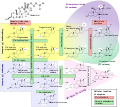Dehydroepiandrosterone sulfate
Dehydroepiandrosterone sulfate (DHEAS) is a steroid hormone produced by the adrenal gland. It is the most abundant circulating steroid in the human body and can be converted into other hormones, such as estrogen and testosterone. DHEAS plays a role in a variety of bodily functions, including immune system response, brain function, and bone density.
Production and Function[edit]
DHEAS is produced in the adrenal cortex, the outer layer of the adrenal gland. The production of DHEAS is controlled by the adrenocorticotropic hormone (ACTH), which is released by the pituitary gland.
The primary function of DHEAS is to serve as a precursor for the production of sex hormones. It can be converted into androgens and estrogens, the male and female sex hormones, respectively.
In addition to its role in hormone production, DHEAS also has other functions in the body. It has been shown to have an effect on the immune system, and it may also play a role in brain function and bone density.
Measurement of DHEAS Levels[edit]
The levels of DHEAS in the body can be measured with a blood test. This test can be used to diagnose conditions related to the adrenal gland, such as Addison's disease or Cushing's syndrome. It can also be used to determine the cause of hirsutism (excessive hair growth) or virilization (development of male characteristics) in women.
Health Implications[edit]
Abnormal levels of DHEAS can indicate a variety of health conditions. High levels of DHEAS can be a sign of an adrenal tumor or polycystic ovary syndrome (PCOS). Low levels of DHEAS can be a sign of adrenal insufficiency or hypopituitarism.
See Also[edit]
Ad. Transform your life with W8MD's Budget GLP-1 injections from $49.99


W8MD offers a medical weight loss program to lose weight in Philadelphia. Our physician-supervised medical weight loss provides:
- Weight loss injections in NYC (generic and brand names):
- Zepbound / Mounjaro, Wegovy / Ozempic, Saxenda
- Most insurances accepted or discounted self-pay rates. We will obtain insurance prior authorizations if needed.
- Generic GLP1 weight loss injections from $49.99 for the starting dose of Semaglutide and $65.00 for Tirzepatide.
- Also offer prescription weight loss medications including Phentermine, Qsymia, Diethylpropion, Contrave etc.
NYC weight loss doctor appointmentsNYC weight loss doctor appointments
Start your NYC weight loss journey today at our NYC medical weight loss and Philadelphia medical weight loss clinics.
- Call 718-946-5500 to lose weight in NYC or for medical weight loss in Philadelphia 215-676-2334.
- Tags:NYC medical weight loss, Philadelphia lose weight Zepbound NYC, Budget GLP1 weight loss injections, Wegovy Philadelphia, Wegovy NYC, Philadelphia medical weight loss, Brookly weight loss and Wegovy NYC
|
WikiMD's Wellness Encyclopedia |
| Let Food Be Thy Medicine Medicine Thy Food - Hippocrates |
Medical Disclaimer: WikiMD is not a substitute for professional medical advice. The information on WikiMD is provided as an information resource only, may be incorrect, outdated or misleading, and is not to be used or relied on for any diagnostic or treatment purposes. Please consult your health care provider before making any healthcare decisions or for guidance about a specific medical condition. WikiMD expressly disclaims responsibility, and shall have no liability, for any damages, loss, injury, or liability whatsoever suffered as a result of your reliance on the information contained in this site. By visiting this site you agree to the foregoing terms and conditions, which may from time to time be changed or supplemented by WikiMD. If you do not agree to the foregoing terms and conditions, you should not enter or use this site. See full disclaimer.
Credits:Most images are courtesy of Wikimedia commons, and templates, categories Wikipedia, licensed under CC BY SA or similar.
Translate this page: - East Asian
中文,
日本,
한국어,
South Asian
हिन्दी,
தமிழ்,
తెలుగు,
Urdu,
ಕನ್ನಡ,
Southeast Asian
Indonesian,
Vietnamese,
Thai,
မြန်မာဘာသာ,
বাংলা
European
español,
Deutsch,
français,
Greek,
português do Brasil,
polski,
română,
русский,
Nederlands,
norsk,
svenska,
suomi,
Italian
Middle Eastern & African
عربى,
Turkish,
Persian,
Hebrew,
Afrikaans,
isiZulu,
Kiswahili,
Other
Bulgarian,
Hungarian,
Czech,
Swedish,
മലയാളം,
मराठी,
ਪੰਜਾਬੀ,
ગુજરાતી,
Portuguese,
Ukrainian




